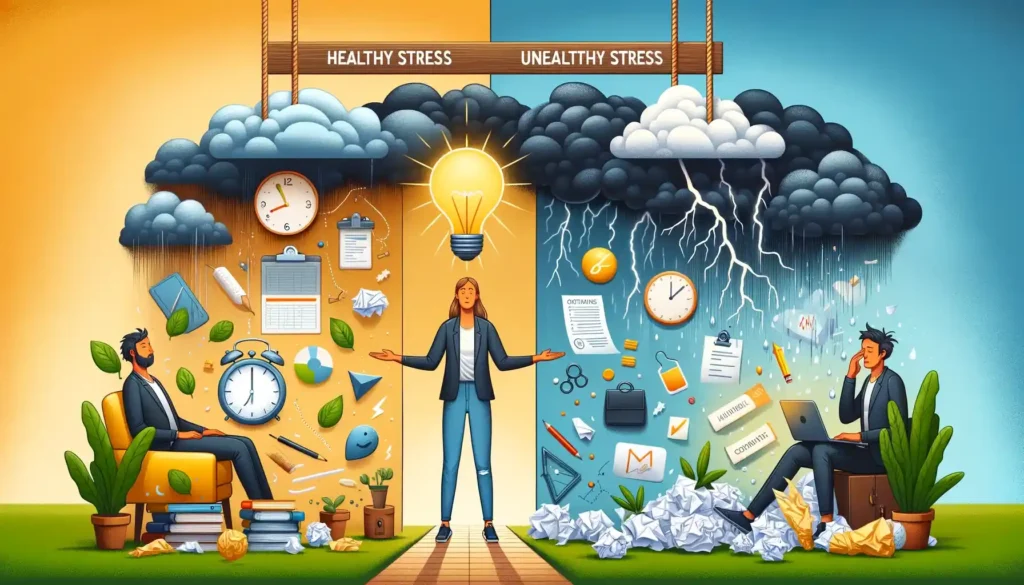Can Stress Kill You: Examining the Real Risks
In the hustle and bustle of modern life, stress has become an all-too-familiar companion for many of us. From looming deadlines to personal pressures, it seems like stress can creep into every corner of our lives. But what if I told you that stress isn’t just a nuisance it could potentially be life-threatening? That’s right, the notion that stress can kill you isn’t just a dramatic exaggeration; there’s actually a wealth of scientific evidence supporting this claim.
But why do so many people feel like stress might just be the end of them? It all boils down to how our bodies react to stressors, triggering a cascade of physiological responses that can wreak havoc if left unchecked.
Let’s explore the science behind stress and its potentially lethal consequences.
What is Stress?
Stress is a ubiquitous aspect of human experience, yet defining it isn’t always straightforward. Stress is the body’s natural response to demands or pressures placed upon it. Whether it’s a looming deadline at work, a difficult conversation with a loved one, or simply navigating the challenges of daily life, our bodies react to these stressors in a variety of ways.
Physiologically, stress triggers a complex cascade of hormonal and neurological responses, mobilizing resources to help us cope with perceived threats. While stress itself isn’t inherently negative—in fact, it can sometimes be beneficial in helping us rise to challenges—chronic or excessive stress can have detrimental effects on both our physical and mental well-being.
Understanding the nature of stress is crucial in recognizing its potential impact on our health and taking proactive steps to manage it effectively.
Healthy VS Unhealthy Stress
Healthy stress, also known as “eustress,” is a normal part of life and can motivate us to achieve our goals. Unhealthy stress, on the other hand, known as “distress,” is excessive and can have detrimental effects on our health and well-being.

Here’s a comparison between the two:
| Aspect | Healthy Stress (Eustress) | Unhealthy Stress (Distress) |
| Response | Motivates and energizes | Overwhelms and exhausts |
| Duration | Short-term, manageable | Prolonged, chronic |
| Effects on body | Enhanced performance | Impaired immune function, cardiovascular issues, mental health problems |
Healthy stress (eustress):
This is a positive kind of stress that motivates you to perform well. It helps you focus, meet deadlines, and achieve your goals. For example, the feeling of excitement you get before a big presentation or the nervousness you feel before a competition are both healthy types of stress.
Unhealthy stress (distress):
This is the negative kind of stress that can lead to health problems, such as anxiety, depression, heart disease, and stroke. It can also weaken your immune system, making you more susceptible to illness. Unhealthy stress is caused by chronic stressors, such as a demanding job, financial problems, or relationship issues.
Here are some of the signs and symptoms of unhealthy stress:
- Anxiety
- Irritability
- Fatigue
- Difficulty sleeping
- Headaches
- Muscle tension
- Stomach problems
- Difficulty concentrating
- Changes in appetite
- Loss of interest in activities you used to enjoy
If you are experiencing any of these signs and symptoms, it’s important to find healthy ways to manage your stress. Here are some tips:
- Exercise regularly. Exercise is a great way to relieve stress and improve your mood.
- Eat a healthy diet. Eating a healthy diet will give you the energy you need to cope with stress.
- Get enough sleep. When you’re well-rested, you’re better able to handle stress.
- Relaxation techniques. There are many relaxation techniques that can help you manage stress, such as yoga, meditation, and deep breathing.
- Time management. Learn how to manage your time effectively so you don’t feel overwhelmed.
- Seek support. Talk to a friend, family member, therapist, or counselor about your stress.
Remember, stress is a normal part of life. But if you’re feeling overwhelmed, there are healthy ways to cope.
Why Do People Say That Stress Can Do You In?
The notion that stress can be lethal isn’t just a baseless exaggeration—it’s grounded in a scientific understanding of the intricate relationship between mind and body. When we say that stress can “do you in,” we’re acknowledging the profound impact it can have on our physical health.
Chronic stress, in particular, has been linked to a host of serious medical conditions, including heart disease, high blood pressure, weakened immune function, and even an increased risk of mortality. But it’s not just the physical toll that’s concerning; prolonged exposure to stress can also take a significant toll on our mental and emotional well-being, contributing to conditions such as anxiety, depression, and burnout.
Understanding why stress is often spoken of in such dire terms requires a deeper exploration of its physiological effects and the ways in which it can disrupt the delicate balance of our bodies and minds.
Stress Impact on the Body
Stress doesn’t just weigh heavily on our minds; its effects reverberate throughout our entire bodies, manifesting in a myriad of physical symptoms and ailments. From head to toe, every system can feel the strain of prolonged stress exposure.
The impact on the body can be profound, influencing everything from our cardiovascular health to our digestive system. Here are some ways stress can affect us physically:
- Cardiovascular health
- Immune function
- Digestive system
- Musculoskeletal system
- Respiratory function
Can Stress Cause Death?
Stress itself may not directly cause death in the way that, say, a heart attack does, its long-term effects on our physical and mental health can certainly contribute to mortality. Chronic stress has been linked to a range of serious medical conditions, such as heart disease, stroke, and immune system dysfunction, all of which can ultimately increase the risk of premature death.
Additionally, the toll that stress takes on mental well-being can indirectly impact health behaviors and quality of life, further exacerbating the risk. While it’s unlikely that stress alone will be listed as the cause of death on a death certificate, its role in undermining overall health and resilience cannot be ignored.
If not stress, then what?
Identifying a singular cause of death is often complex, as it typically involves a combination of factors rather than a single culprit. While stress can certainly contribute to various health issues that increase the risk of mortality, attributing death solely to stress is rarely accurate.
Instead, it’s more common to consider underlying health conditions, lifestyle factors, genetic predispositions, and environmental influences when examining the causes of death.
For example, heart disease, cancer, respiratory disorders, and accidents are among the leading causes of death globally, and while stress may exacerbate these conditions, it’s seldom the sole determining factor. Understanding the multifaceted nature of mortality underscores the importance of holistic approaches to health and well-being that address both physical and psychological aspects of wellness.
How Can Coping Strategies Help You & What are these?
Coping strategies play a crucial role in mitigating the negative effects of stress and promoting resilience in the face of adversity. By adopting effective coping mechanisms, individuals can better manage stressors and maintain their overall well-being.
Here are some ways coping strategies can help and a few examples of these techniques:
- Reduce stress levels and promote relaxation
- Enhance problem-solving skills and decision-making abilities
- Improve emotional regulation and self-awareness
- Foster social support and interpersonal connections
Examples of coping strategies:
- Mindfulness meditation
- Exercise and physical activity
- Seeking social support from friends and family
- Engaging in hobbies or creative activities
- Cognitive-behavioral techniques such as reframing and thought challenging
- Time management and organization skills
- Relaxation techniques like deep breathing or progressive muscle relaxation
What Can Happen if Stress is Left Unchecked?
Leaving stress unchecked can have far-reaching consequences that impact both physical and mental health. Chronic or excessive stress can lead to a range of detrimental outcomes, including:
- Increased risk of cardiovascular problems such as heart disease, hypertension, and stroke
- Weakened immune system, making individuals more susceptible to infections and illnesses
- Digestive issues such as irritable bowel syndrome (IBS), acid reflux, and ulcers
- Sleep disturbances, including insomnia or disrupted sleep patterns
- Mental health disorders like anxiety, depression, and burnout
- Impaired cognitive function, including memory problems and difficulty concentrating
- Negative effects on relationships, work performance, and overall quality of life
Unchecked stress not only diminishes one’s well-being in the present but also sets the stage for long-term health complications if left unaddressed. Therefore, it’s crucial to recognize the signs of stress and take proactive steps to manage it effectively.
So, Can Stress Kill You
Absolutely not! While stress can undoubtedly have profound effects on your health, it’s essential to maintain a positive outlook and recognize the power you have to manage and mitigate its impact. By implementing healthy coping strategies, fostering social support networks, prioritizing self-care, and seeking professional help when needed, you can effectively navigate through stressful times and protect your well-being.
Remember, resilience is your greatest asset, and with the right tools and mindset, you can overcome challenges and thrive, ensuring that stress doesn’t have the final say in your life.
Closing Note
While stress can certainly pose challenges to our health and well-being, it’s important to remember that it doesn’t have to be a death sentence. By understanding the impact of stress on our bodies and minds and implementing proactive coping strategies, we can effectively manage its effects and cultivate resilience.
Whether through mindfulness practices, physical activity, or seeking support from loved ones, there are countless ways to navigate stress and emerge stronger on the other side.
FAQs
Q 1: How do you know if stress is killing you?
Ans: If you are experiencing persistent physical symptoms like headaches, chest pain, digestive issues, or frequent illnesses, it could be a sign that stress is taking a toll on your health. Additionally, prolonged feelings of overwhelm, anxiety, or hopelessness may indicate that stress is negatively impacting your mental well-being.
Q 2: What does extreme stress feel like?
Ans: Extreme stress can manifest differently for each individual, but common symptoms include racing thoughts, difficulty concentrating, irritability, muscle tension, and changes in appetite or sleep patterns. Emotionally, you might feel overwhelmed, on edge, or constantly on high alert.
Q 3: Does stress shorten your life?
Ans: While stress itself may not directly shorten your life, chronic or excessive stress can contribute to the development of serious health conditions like heart disease, stroke, and mental health disorders, which can ultimately impact longevity. However, by effectively managing stress through healthy coping strategies, you can mitigate its negative effects and improve overall well-being.















